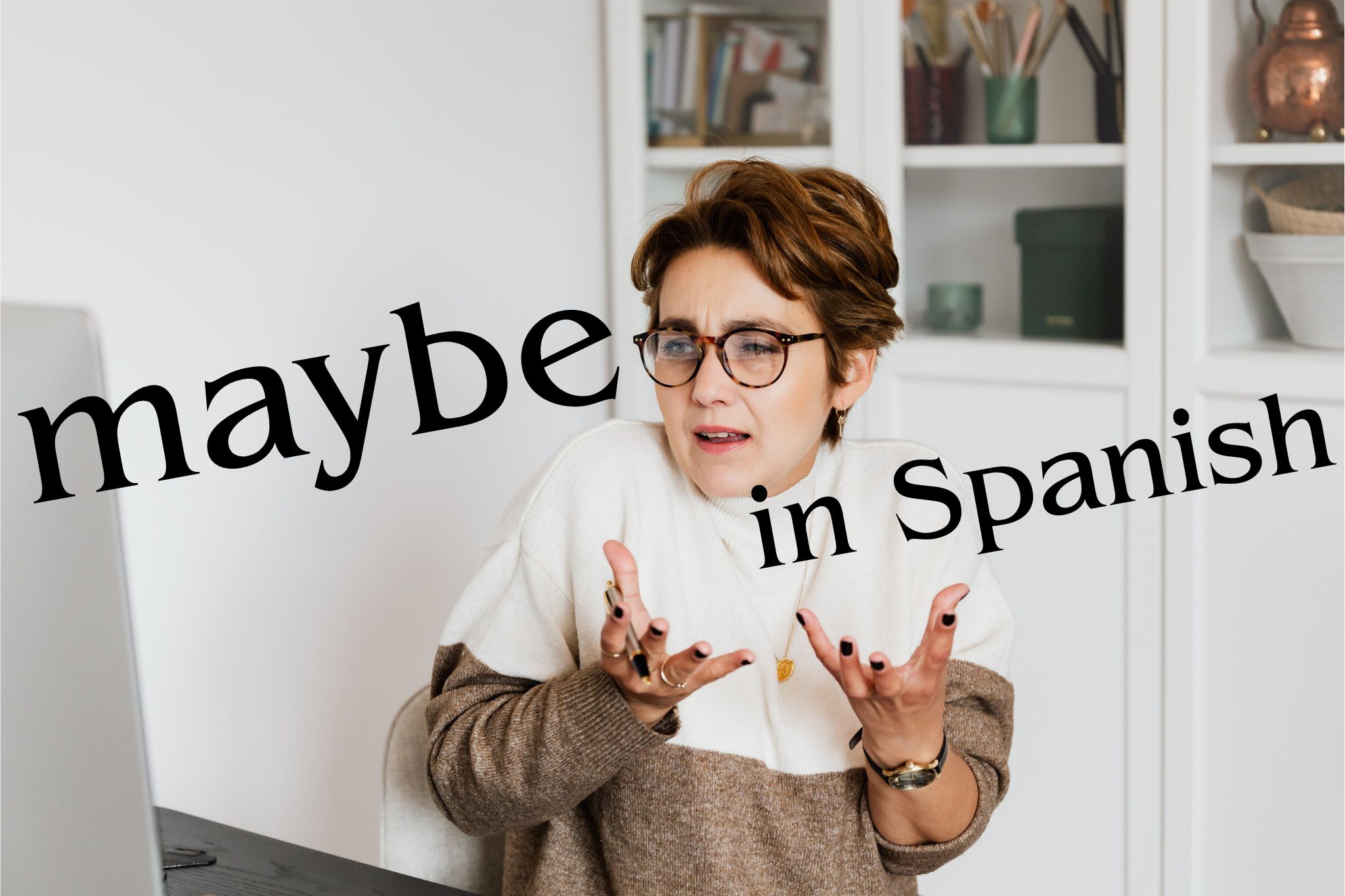How to say Maybe in Spanish: Tal vez, Quizá, and more

Get our free email course, Shortcut to Conversational.
Have conversations faster, understand people when they speak fast, and other tested tips to learn faster.
More infoOne of the beautiful qualities of the Spanish language is its versatility in expressing a single concept in numerous ways. Such diversity allows us to acknowledge subtle nuances in our intentions, while also allowing us to avoid repetition when expressing similar concepts. Today we’ll delve into a number of different ways to express maybe in Spanish.
In English, maybe and perhaps are different ways of expressing uncertainty. In Spanish, we have a rich variety of words and phrases to convey such possibility or uncertainty.
In today’s post, we’ll to take you beyond the simple tal vez and quizá, and equip you with some additional vocabulary to express varying levels of uncertainty. So get ready to take your Spanish skills to the next level as we explore how to say maybe in Spanish!
Maybe with the Spanish subjunctive mood
Before we get into the different words for maybe and perhaps in Spanish, we need to mention that the majority of these terms will trigger the subjunctive mood in the verb which follows.
To give a basic overview of when we need to use the Spanish subjunctive, it’s generally required when there’s some inherent degree of uncertainty about the action we’re describing. By definition, beginning a statement with any of the Spanish maybe words we’ll introduce here indicates such uncertainty!
We’ll leave it at that for this lesson, since our focus is rather on the different options for expressing maybe in Spanish. Please refer to our in-depth post on the Spanish subjunctive for a complete lesson on this mood. We also recommend our other post on additional subjunctive trigger words in Spanish.
For now, just remember that you’ll need to use the subjunctive after the various Spanish maybe words we’ll present here. Now let’s get into our vocab for maybe and perhaps in Spanish!
Tal vez
Tal vez is probably the most common way to express uncertainty in Spanish.
Unlike the other Spanish maybe words we’ll look at in this post, tal vez can be followed with a verb in either the indicative or the subjunctive mood.
We use the indicative mood when we are quite confident that that the verb’s action is true.
- Tal vez está hablando por teléfono. Está en la oficina, ¿no? – Maybe he is on the phone now. He’s in his office, right?
We use the verb in the subjunctive mood when we think there’s no chance that the verb’s action will happen.
- Tal vez no vaya a correr al parque hoy. Estoy muy cansada. – Maybe I won’t go running in the park today. I’m very tired.
Note that tal vez can also be written as one word, talvez, although this form is less common than the two-word variant.
- Talvez nieve más tarde. – Maybe it’s going to snow later.
Quizá, Quizás
This word for perhaps in Spanish has two correct spellings, both of which may be used interchangeably: quizá or quizás.
Quizá is a synonym of tal vez, so using either one will will convey the same meaning. However, unlike tal vez, quizá always triggers the subjunctive.
- Quizá vaya a la fiesta mañana. – Perhaps I’ll go to the party tomorrow.
- Quizás no venga nadie a la fiesta. – Perhaps nobody comes to the party.
- Quizá deberíamos comprar ese papel higiénico antes de que se agote en las tiendas. – Perhaps we should buy that toilet paper before the store runs out of it.
For music fans, you may recognize this expression from a classic Nat King Cole tune where he sings in Spanish: Quizás, Quizás, Quizás (Perhaps, Perhaps, Perhaps).
Puede ser, Puede que
Puede ser and puede que can be used interchangeably to say maybe in Spanish.
Puede is the third-person singular conjugation of the verb poder, meaning to be able to, and ser is the infinitive of the verb to be, so the literal translation of puede ser is it can be or it may be.
- Puede que no vayamos con ustedes al partido. – Maybe we won’t go with you to the game.
- Puede que no me haya entendido. – Maybe he didn’t understand me.
- Puede ser que ese sea nuestro pedido. – That may be our order.
- ¿Ese no es el carro de tu hermana? / Puede ser. – Isn’t that your sister’s car? / It may be.
- ¿Vas a comprar una moto? / Puede ser. Aún no lo he decidido. – Are you going to buy a motorbike? / Maybe. I haven’t made up my mind yet.
Posiblemente, Es posible que
Another common word for maybe in Spanish is posiblemente. We use it in more formal situations, especially in written texts. Posiblemente is an adverb whose English translation is possibly.
- Posiblemente, las sequías se deban al cambio climático. – Possibly, droughts are caused by climate change.
- Posiblemente, las tasas de interés aumenten el mes próximo. – Possibly, interest rates will rise next month.
Es posible que translates literally as it is possbile that, and can be used interchangeably with posiblemente. While both of these options imply that something may happen or be true, they still require the use of the subjunctive in the verb that follows.
- Es posible que los maestros no finalicen la huelga hasta la semana próxima. – Maybe the teachers won’t end the strike until next week.
- Es posible que los impuestos disminuyan el año próximo. – Maybe taxes will fall next year.
Capaz que
Capaz que is an informal phrase commonly used to mean maybe in Spanish, so it’s unlikely that you’ll see it in writing. Unlike most of the other options for Spanish maybe in this post, capaz que can be followed by either the subjunctive or the indicative; the indicative is more common.
Let’s see some examples where we use capaz to express maybe in colloquial situations. The first example uses the subjunctive, while the next two use the indicative.
- Capaz que no vaya a visitar mi amiga. Tengo fiaca. – Maybe I won’t visit my friend. I’m lazy.
- Decir la verdad capaz que es mejor, ¿no te parece? – Maybe telling the truth is better, don’t you think?
- Capaz que tenemos suerte y encontramos lugar para estacionar. – Maybe we are lucky and find a parking space.
A lo mejor
Like capaz, a lo mejor is another of our informal options. It’s one of the best ways to say maybe in Spanish when talking about possibilities or hypothesizing about uncertain facts with friends.
- A lo mejor Pedro venga en un rato. No sé. – Maybe Pedro will come in a while. I don’t know.
- A lo mejor Pedro no quiso venir porque estaba su ex novia aquí. – Maybe Pedro didn’t want to come because his ex-girlfriend was here.
- A lo mejor esta vez ganamos el partido. – Maybe this time we win the game.
Igual
Generally speaking, the word igual means same or equal. In Spain, however, it is sometimes used in colloquial contexts to mean maybe. Igual is an example of one of the many words words whose meanings can differ between Spain and Latin America.
With this in mind, let’s see some examples where we can use igual to mean maybe in Spanish!
- ¿Crees que terminarás el trabajo en dos horas? / Igual sí. No es muy difícil. – Do you think you’ll finish the work in two hours? / Yeah maybe. It’s not that hard.
- Igual mañana no abra la tienda. – Maybe tomorrow the store will not open.
Conclusion
We’ve now seen how to say maybe in Spanish in many different ways. We covered some of the more formal phrases, such as posiblemente and tal vez, while we also included some more informal vocabulary such as capaz or lo mejor.
With the explanations and examples we offered you today, perhaps you’re ready to use all these different options for maybe in Spanish!



